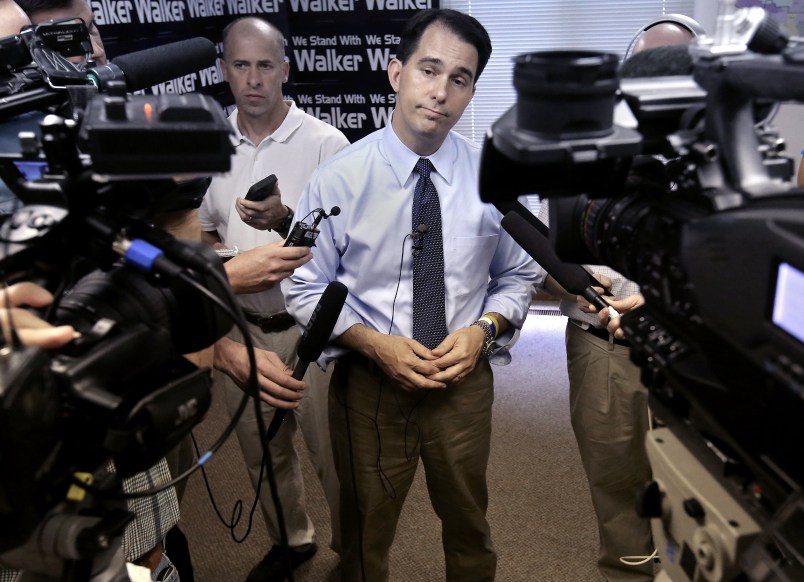MADISON, Wis. (AP) — Prosecutors investigating Wisconsin Gov. Scott Walker’s recall election campaign hope to convince a federal appeals court to eventually allow them to resume a probe of possible illegal fundraising and coordination with conservative groups.
The arguments Tuesday before the 7th U.S. Circuit Court of Appeals in Chicago come two months before Walker — a Republican who is seen as a potential 2016 candidate for president — faces re-election against Democrat Mary Burke.
Walker made a national name for himself when he took on public sector unions in 2011 with his measure that effectively ended collective bargaining for most public workers. That fight led to the 2012 vote to recall Walker, which he won, making him the first governor in U.S. history to defeat a recall.
But he has been hounded by secret investigations, first of aides and associates before he became governor and now on his recall campaign and other conservative groups.
No one has been charged in the latest probe and prosecutors have said Walker is not a target. Walker and Republicans have dismissed the investigation as a partisan witch hunt, while Democrats say it has revealed serious questions about possible illegal activity by Walker and his backers.
Prosecutors, who opened the investigation in 2012, want the appeals court to reverse a preliminary decision halting the investigation in May and dismiss the federal civil rights lawsuit filed by the conservative Wisconsin Club for Growth and its director, Eric O’Keefe.
The appeals court was also scheduled to hear arguments over a media coalition’s request that all records in the case be made public.
Two Republican appointed judges and one Democratic appointee will hear the appeal, the court said Tuesday before arguments began. They are the 7th Circuit’s chief judge, Diane Wood, who was appointed by President Bill Clinton in 1995, along with Frank Easterbrook, appointed by President Ronald Reagan in 1985, and William Bauer, appointed by Gerald Ford in 1974.
Polls show Walker’s race with Burke is close and it isn’t clear whether the appeals court will rule before the Nov. 4election. And even if the court allows the investigation to resume, a state judge who also blocked the probe in January could keep it on hold. The state ruling also is being appealed.
The case largely centers on the type of political activity being done by the conservative groups during therecall campaign and whether that work required them to follow state laws that bar coordination with candidates, requires disclosure of political donations and places limits on what can be collected.
Under Wisconsin law, third-party political groups are allowed to work together on campaign activity, but are barred from coordinating that work with actual candidates.
Prosecutors have said in court filings that they are looking into allegations of illegal campaign activity involvingWalker, the Wisconsin Club for Growth, the state chamber of commerce and more than two dozen otherconservative groups during the 2011 and 2012 recalls.
Special prosecutor Francis Schmitz described in court filings what he called a “criminal scheme” by Walker to evadecampaign fundraising and coordination laws. An attorney for Schmitz subsequently said Walker was not a target of the probe and that no determination had been made to bring any charges.
The Wisconsin Club for Growth argues that coordinating with candidates on issue advocacy — communications that don’t expressly ask a voter to elect or defeat a candidate — is legal.
U.S. District Judge Rudolph Randa, in his May ruling halting the investigation, agreed with the Wisconsin Club for Growth. He said that prosecutors incorrectly interpreted state law to require that groups report spending on issue advocacy.
The Wisconsin Club for Growth lawsuit seeks both professional and personal damages from the defendants. Theprosecutors argue they have immunity from being sued.
The probe comes after a previous secret investigation into former aides and associates of Walker’s when he was Milwaukee County executive. Six people were convicted on a series of charges including theft and misconduct in office as a result of that investigation, which ended in 2013. Walker was not charged.
___
Follow Scott Bauer on Twitter at https://twitter.com/sbauerAP
Copyright 2014 The Associated Press. All rights reserved. This material may not be published, broadcast, rewritten or redistributed.







I strongly suspect the judge in this case reeeaaaallllllly doesn’t want to be involved in this case, especially if the judge is a Pubbie. This investigation can’t be shut down now in view of what has already been found about shady dealings without looking very fishy.
I hope to see Orange in walleyed walkers future!